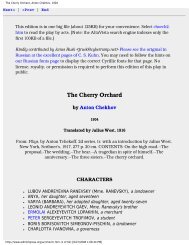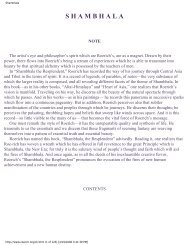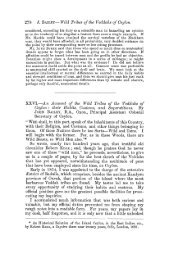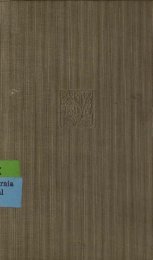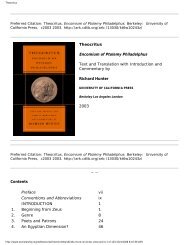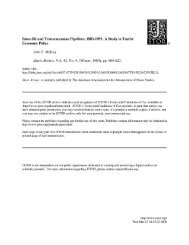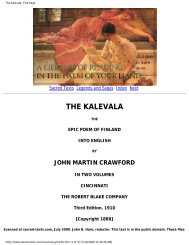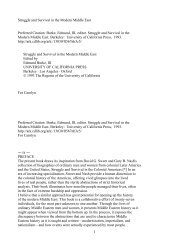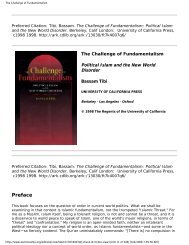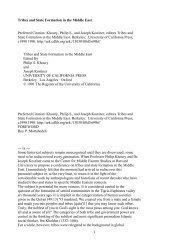Between Two Worlds Kafadar.pdf
Between Two Worlds Kafadar.pdf
Between Two Worlds Kafadar.pdf
You also want an ePaper? Increase the reach of your titles
YUMPU automatically turns print PDFs into web optimized ePapers that Google loves.
institutions or did they create their own?[25] These too are serious questions<br />
for the historian, but they lack the imbroglio of nationalist polemics, at least<br />
in a directly perceptible way. Had Normandy been a nation-state or a province<br />
with self-assertive Normans, the situation might have been different. Whereas,<br />
if in the questions posed above you were to replace Normans with early Ottomans,<br />
and Carolingian with Byzantine, you could have a whole range of settings for a<br />
politically charged discussion, from the corridors of a university to a<br />
coffeehouse in Istanbul or Thessaloniki. Charming as this may sound, there are<br />
drawbacks, as illustrated by the case of Petropoulos, who was persecuted under<br />
the Greek junta for, among other<br />
― 26 ―<br />
things, writing a book called Ho tourkikos kaphes ("Turkish coffee," which the<br />
junta ordered to be called "Greek coffee"). Similarly, under the Turkish junta<br />
of the early 1980s, an academician could suffer for writing about the presence<br />
of Armenian and other Christian fief-holders in the early Ottoman armies, whose<br />
existence is an undeniable fact. Such tensions may get more serious under<br />
military regimes but are not limited to them; even in "normal times," one can<br />
feel the heat generated by arguing whether Cyril and Methodius were Greek or<br />
Slavic, or by dealing with the ethnic origins of Sinan , that most accomplished<br />
of Ottoman architects who was recruited in the sixteenth century through a levy<br />
that was applied to non-Muslim subjects.<br />
True, the majority of historians have scoffed at this sort of thing, but without<br />
directly tackling the assumption of a continuous national identity, a linear<br />
nationhood or national essence that underlies even their own nonchauvinistic<br />
historiography. If "we" (from the point of view of modern Turkish consciousness)<br />
or "the Turks" (from the point of view of non-Turkish historiography) have come<br />
on horseback from Inner Asia and established a state that replaced the Byzantine<br />
Empire of "the Greeks;' it is only human that to be "one of us" (or "one of the<br />
Turks") one needs to assume, or in some cases feels compelled to "prove," that<br />
one's ancestry derives from the steppe nomads. And if one is of the Greeks, then<br />
one "knows" that one's ancestors have been oppressed by the Turks. Fortunately,<br />
such assumptions or presumptions can usually be made relatively easily at the<br />
individual level, where one slips into the role of<br />
citizen-as-member-of-the-nation (unless one is from a self-conscious minority,<br />
in which case one is a member of another "we" in a similarly linear story). It<br />
must have been rather traumatic, however, for a republican descendant of Köse<br />
Mihal (Mikhalis the Beardless), one of the founding fathers of the Ottoman<br />
state, a Bithynian Christian who joined forces with Osman, converted, and<br />
started a minidynasty of raiders in the service of the House of Osman. The<br />
twentieth-century Turk, proud enough to take Gazimihal as his last name, at the<br />
same time felt compelled to write an article "proving" his glorious ancestor was<br />
also a Turk. In this fanciful account, Mihal is one of those Christianized Turks<br />
employed by the Byzantines who eventually chooses to join his brethren on the<br />
right side.[26]<br />
The essentialist trap cannot be avoided unless we, the historians, problematize<br />
the use of "the Turks" (or any other ethnonym for that matter), systematically<br />
29



